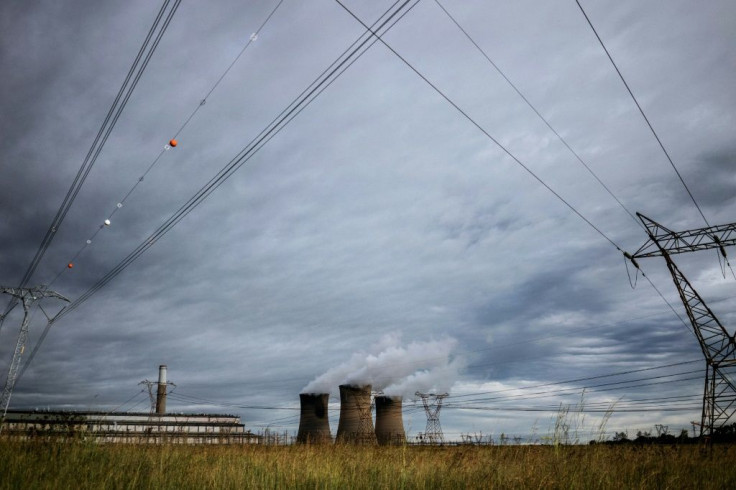Chairman of South Africa’s Embattled Electric Utility Eskom Resigns

KEY POINTS
- Eskom will also get an entirely new board
- Unions have demanded changes in Eskom’s leadership
- Eskom has some $32 billion in debt
Jabu Mabuza, the chairman and CEO of Eskom Holdings, the South African electricity public utility, suddenly resigned on Friday. South African President Cyril Ramaphosa also said Eskom will get a new board that will comprise of mix of people with experience in the electricity industry, engineering and corporate governance.
The new CEO André de Ruyter took over immediately.
"In his resignation letter, Mabuza apologized for Eskom's inability to meet the commitment it made to the president, the deputy president and the relevant ministers at a meeting on Dec. 11, 2019 to avoid load shedding over this period," the presidency said in a statement.
Load shedding refers to the practice of temporarily shutting off electric power in certain parts of the country in order to prevent failure of the entire grid.
South Africa has been inundated by daily load shedding over the past week, cutting off power to millions of people.
"Government continues to support the measures being taken by Eskom to restore reliable electricity supply as a matter of priority and is proceeding with measures to introduce new generation capacity – including self-generation – in the shortest possible time," the presidency added.
Eskom, laden with heavy debts, has come under fire from many quarters in South Africa over its excessive power outages, dependence on state bailouts and perceived incompetence.
One of South Africa's oldest trade unions, UASA, criticized Eskom on Friday for endangering the welfare of businesses that depend on steady electric power.
"Eskom’s incompetence, if continued, will also have a disruptive effect on the enrollment and registration processes of universities and other tertiary institutions that may result in delays into the academic year," said UASA spokesperson, Stanford Mazhindu.
Eskom already has debts of about $32 billion and may need more government bailouts to survive.
South Africa’s biggest labor group, Congress of South African Trade Unions, better known as COSATU, called for not only the dismissal of Eskom’s entire board but also the resignation of Public Enterprises Minister Pravin Gordhan, who oversees Eskom, citing his mismanagement of the utility’s operations and finances.
“This board [at Eskom] has been there for two years and they don’t have a strategy or turnaround plan and they don’t seem to have a funding plan except to dismantle Eskom,” said Sizwe Pamla, the national spokesman of COSATU. “On top of that we have load shedding, so heads must roll.”
The World Bank has even reduced South Africa's economic growth forecast for 2020 to below 1% partly due to the country’s unstable power supply.
UASA called on Eskom’s new boss to resolve these issues.
"UASA is deeply disappointed and pleads with newly appointed Eskom chief executive Andre de Ruyter to come up with a plan to rescue Eskom, starting with the power deficit and debts that are holding South Africa’s economy back. We applaud him for starting his tenure 15 days early as it signals the state of emergency at Eskom and that time is of the essence," added Mazhindu.
Pamla of COSATU warned that the ongoing power crisis with taint President Ramaphosa himself.
“This was supposed to be an era where things would be done differently,” he said, adding Ramaphosa’s credibility is now in question.
COSATU also wants Gordhan removed.
“If Gordhan is unable to hold these board members accountable then as the political [appointee], he must fall on his sword,” Pamla said. “We can’t bully him but we are putting this forward to President Ramaphosa for his consideration.”
Eskom has also called for steep tariff hikes of up to 15%, something unions strongly oppose.
Unions warmed that such tariff hikes would punish South African consumers and badly damage the economy
“Eskom should be developing plans to recover the looted monies and collecting what is owed to it by state-owned entities, government departments, municipalities and private companies who are rigging the electricity system and stealing from Eskom,” Pamla said.
Late last year Eskom received a $4 billion bailout from the government, prompting much criticism from opposition parties and the public. That lifeline followed a $1.6 billion bailout approved in February.
Moreover, the government has guaranteed even more bailouts totaling $4.8 billion through 2021.
Vuslat Bayoglu, executive chairperson of Canyon Coal, a South African exploration, mining and processing company, recommended that Eskom’s new boss makes certain the maintenance of power plants are done on time. “Scheduled maintenance should not be missed because the consequences of shortcuts tend to be dire,” he said. “The public should be informed of the maintenance schedule.”
Bayoglu also warned that corruption must be extinguished.
“The government’s anti-corruption framework is one of the strongest in the world,” he noted. “Given the need for competitive, transparent and cost-effective procurement in state-owned companies, Eskom was supposed to be ruthless in tackling corruption.”
© Copyright IBTimes 2025. All rights reserved.





















